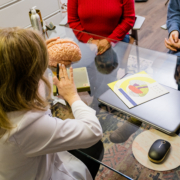What Wendy Williams teaches us about dementia
By now you’ve likely read the news about actor and talk show host Wendy Williams; last week she and her publicity team acknowledged that Williams has been diagnosed with frontotemporal dementia (FTD)—specifically a variant known as primary progressive aphasia.
This news came two days before the release of a Lifetime documentary about her life; a film that comprised footage of how significantly Williams’ FTD has impacted her cognition.
There’s no question the Williams story is a tragedy. In addition to the heartbreaking nature of her disease, Williams’ family situation appears to be in utter disarray. Williams herself is currently living inside a facility under the financial control of a court-appointed guardian, as her family has been essentially shut out of her life.
Still, at 59, the former star of “The Wendy Williams Show” has plenty to teach the rest of us.
First are some general lessons about FTD. Of all the dementias, this one is among the most difficult for family members to stomach because of how dramatically it can change someone’s personality. Unlike other forms of dementia, FTD currently has no disease-modifying treatments.
The Williams story also serves as a reminder that primary progressive aphasia—the same dementia variant that afflicts actor Bruce Willis—is a serious challenge, a disorder that affects how patients communicate (literally).
There are other lessons to be learned here, too.
Dr. Amy Halpin, currently completing her postdoctoral fellowship through Harvard University at Massachusetts General Hospital, said early detection of FTD is critical.
“Early detection [is] important [because] the proper medical care team can be mobilized (e.g., neurologists, genetic counselors, speech language pathologists, social workers, etc.) who are best suited to provide both the patient and their family with resources,” she wrote in a recent email. “If we can get a good handle on the type of pathology causing the FTD (e.g., tau vs. TDP-43), we can even more accurately provide disease modifying therapies during a time in which the disease process may be more amenable to treatment.”
Dr. Amelia Anderson-Mooney, a clinical neuropsychologist in Glasgow, Kentucky, said early diagnosis of FTD can also be seriously helpful for family members to wrap their heads around what is happening.
“Early diagnosis allows patients to participate in their treatment plans and long-term/practical planning- actively participating in choices for long-term care, choices for power of attorney, living wills/advance directives, and last wills and testaments,” Dr. Anderson-Mooney said.
She added: “It gives families an opportunity to understand what comes next for their loved one- what might the next few years look like? This helps families prepare and anticipate what sort of assistance their loved one might need and how they might go about obtaining that help. This can also help families access support for themselves, including both online and in-person support groups.”
Dr. Halpin, the doctor from Mass General, said FTD also can present some challenges with regard to clinical treatment.
Specifically, she said FTD can often mimic other types of neurodegenerative processes (e.g., frontal variant Alzheimer’s disease or vascular dementia), types of psychiatric illnesses (e.g., bipolar or schizophrenia), and even brain tumors (particularly when the tumors are in either the frontal or temporal lobes). She added that this is problematic because evidence-based therapies for each of these presentations varies widely.
Perhaps the most important takeaway from the Wendy Williams saga is what it tells us about the prevalence of dementia among African Americans here in the United States.
The reality: Black Americans are roughly two times more likely to develop conditions that bring loss of cognitive functioning that impair thinking, remembering, learning, reasoning, and more.
A recent article in Essence magazine laid out this predicament, noting that the risks and toll of dementia on Black communities are vastly under addressed.
In the wake of the drama surrounding the Williams documentary, it would be easy to judge the family members and become hardened to the heartbreak connected to the actor’s dementia. Instead, it’s important to look at the Wendy Williams tragedy for the truths it has revealed, and to learn from the realities facing us all.
This story has been factchecked. For more about that process click here.
Photo credit: WBLS, Wendy Williams WBLS Interview, CC BY 3.0









